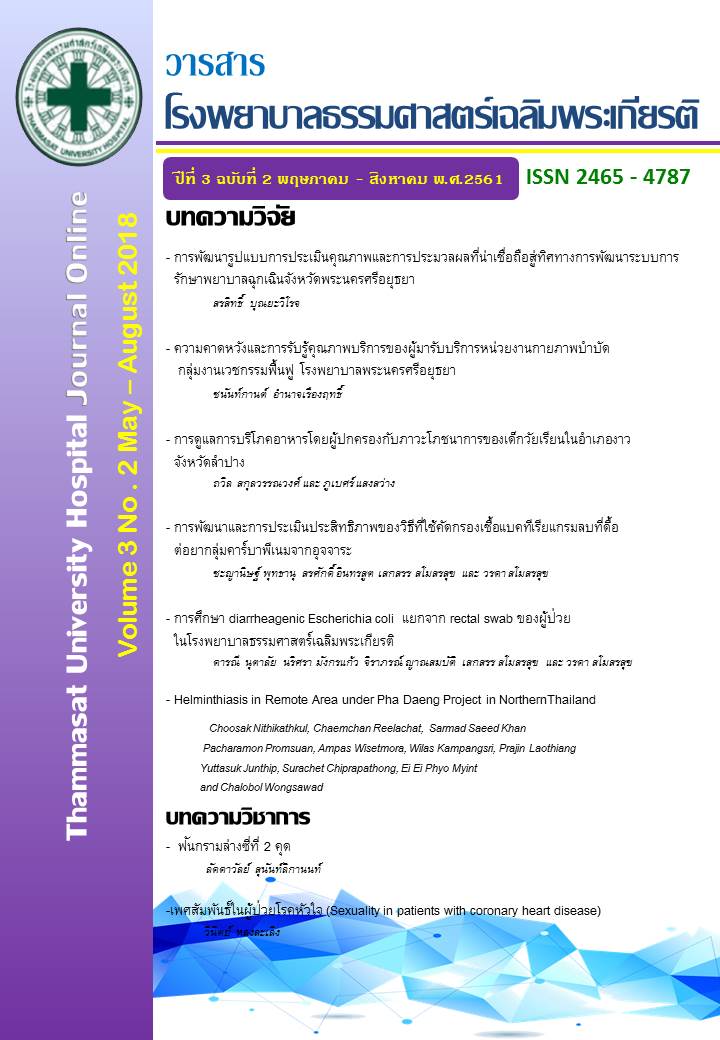Development and evaluation of screening method for carbapenem-resistant Gram negative bacteria (CR-GNB) in stool cultures
Keywords:
Carbapenems, Carbapenem-Resistant Gram negative bacteria (CR-GNB)Abstract
Background : Carbapenemases production of Gram-negative bacteria is a major mechanism of multidrug resistance in beta-lactam drugs including carbapenem group. The long stay hospital patients could detect carbapenem resistant Gram-negative bacteria (CR-GNB) in fecal samples, and these strains could transmit from person to person asymptomatically. Screening of CR-GNB in fecal samples could control the spread of these strains among patients in the hospital.
Objective : This study aimed to develop and evaluate pooled-organisms disk diffusion method (PODD) for screening CR-GNB in fecal samples
Material and methods : Twenty-three of carbapenamases producing strains were spiked in fecal samples and evaluated their recovery. The result of PODD method was compared with those of chromogenic agar assay and multiplex PCR for blaKPC, blaNDM, blaIMP, blaOXA and blaVIM
Result : The result revealed that the PODD method using imipenem, meropenem and doripenem disk showed 100% sensitivity, 100% specificity, 100% positive predictive value (PPV) and 100% negative predictive value (NPV) like multiplex PCR.
Conclusion : The PODD method is cost effective, simply to apply for screening CR-GNB in fecal samples in routine work.
References
Schechner, V., Straus-Robinson, K., Schwartz, D., Pfeffer, I., Tarabeia, J., Moskovich, R., Chmelnitsky, I., Schwaber, M..J., Carmeli, Y. and Navon-Venezia, S. Evaluation of PCR-Based Testing for Surveillance of KPC-Producing Carbapenem-Resistant Members of the Enterobacteriaceae Family. J Clin. Microbiol 2009; 47:3261-3265.
Queenan, A. and Bush, M. K. Carbapenemases: the Versatile β-Lactamases Clin. Microbiol Rev 2007; 20:440–458.
Miriagou, V., Cornaglia, G., Edelstein, M., Galani, I., Giske, C. and Gniadkowski, M. Acquired Carbapenemases in Gram-Negative Bacterial Pathogens: Detection and Surveillance Issues. J Clin Microbiol Infect 2010; 16(2):112–122.
Gijón, D., Curiao, T., Baquero, F., Coque, T. M. and Cantón, R. Faecal Carriage of Carbapenemase-Producing Enterobacteriaceae: A Hidden Reservoir in Hospitalized and Nonhospitalized Patients. J Clin Microbiol 2012; 50(5):1558-1563.
Adler, A., Navon-Venezia, S., Moran-Gilad, J., Marcos, E., Schwartz, D. and Carmeli, Y. Laboratory and Clinical Evaluation of Screening Agar Plates for Detection of Carbapenem-Resistant Enterobacteriaceae from Surveillance Rectal Swabs. J Clin Microbiol 2011; 49(6):2239-2242.
Gazin, M., Paasch, F., Goossens, H. and Malhotra-Kumar, S. Current Trends in Culture-Based and Molecular Detection of Extended-Spectrum--Lactamase-Harboring and Carbapenem-Resistant Enterobacteriaceae. J Clin Microbiol 2012; 50(4):1140-1146.
Lee, T. D., Adie, K., McNabb, A., Purych, D., Mannan, K., Azana, R., Ng, C., Tang, P. and Hoang, L. M. N. Rapid Detection of KPC, NDM, and OXA-48-Like Carbapenemases by Real-Time PCR from Rectal Swab Surveillance Samples. J Clin Microbiol 2015; 53(8):2731-2733.
Blackburn, J., Tsimiklis, C., Lavergne, V., Pilotte, J., Grenier, S., Gilbert, A., Lefebvre, B., Domingo, M. C., Tremblay, C. and Bourgault, A. M. Carbapenem Disks on MacConkey agar in Screening Methods for the Detection of Carbapenem-Resistant Gram-Negative Rods in Stools. J Clin Microbiol 2013; 51(1):331-333.
Clinical and Laboratory Standards Institute (CLSI). Performance Standards for Antimicrobial Susceptibility Testing; Approved Standard; 27th Information Supplement. CLSI document M100-S27. Clinical and Laboratory Standards Institute, Wayne, PA; 2017.
Clinical and Laboratory Standards Institute (CLSI). Methods for Antimicrobial Dilution and Disk Susceptibility Testing of Infrequently Isolated or Fastidious Bacteria; Approved guideline – third edition. CLSI document M45-A3. Clinical and Laboratory Standards Institute, Wayne, PA; 2015.
Doyle, D., Peirano, G., Lascols, C., Lloyd, T., Church, D. L. and Pitout, J. D. Laboratory Detection of Enterobacteriaceae that Produce Carbapenemases. J Clin Microbiol 2012; 50(12):3877-3880.
Nordmann, P., Gniadkowski, M., Giske, C. G., Poirel, L., Woodford, N. and Miriagou, V. Identification and Screening of Carbapenemase-Producing Enterobacteriaceae. Clin Microbiol Infect 2012; 18(5):432-438.
Vasoo, S., Cunningham, S. A., Kohner, P. C., Simner, P. J., Mandrekar, J. N., Lolans, K., Hayden, M. K. and Patel, R. Comparison of a Novel, Rapid Chromogenic Biochemical Assay, the Carba NP Test, with the Modified Hodge Test for Detection of Carbapenemase-Producing Gram-Negative Bacilli. J Clin Microbiol 2013; 51(9):3097-3101.



